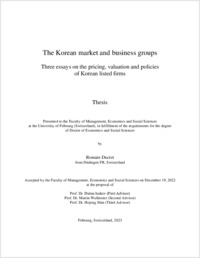The Korean market and business groups : three essays on the pricing, valuation and policies of Korean listed firms
SPR
- Ducret, Romain
- Isakov, Dušan (Degree supervisor)
- Fribourg (Switzerland), 2023
1 ressource en ligne (190 pages) ; 1 fichier pdf
Thèse: Université de Fribourg (Suisse), 2023
English
This dissertation presents three essays on the Korean market and business groups. In Korea, large business groups called chaebols played and continue to play a prominent role in the economy. While the existing literature is primarily focused on the period of the 1997 Asian financial crisis, this dissertation analyzes the subsequent period. The beginning of the twenty-first century saw the rise of Korea as a global player and the emergence of Korean firms as leaders in several key industries. This dissertation explores research opportunities opened up by this recent evolution in three empirical studies.
The first essay documents the “Korea discount”, which refers to the undervaluation of the Korean stock market. Despite practitioner interest, scholars did not address this topic. This article fills this literature gap and provides the first empirical evidence of this phenomenon. The Korea discount persists despite reforms aiming at reaching international standards. The study shows that the phenomenon affects both chaebol and non-chaebol firms. This observation suggests that chaebols are not the direct cause of the Korea discount contradicting a common belief.
The second study exploits the revenue shock triggered by the COVID-19 pandemic to examining the value of business group affiliation during an economic downturn. The analysis reveals a switch in the value of affiliation as the crisis unfolded. The discount observed at the beginning of the crisis turned into a premium when the stock market started its recovery. Financial and governance risks appear as important drivers of variations in the value of affiliation. In addition to extend the growing COVID-19 literature, this study complements the literature on chaebol and crisis with a new empirical framework.
The third essay examines the effect of affiliation on firm performance and firm policies. Overall, affiliation with a chaebol is associated with a higher firm value and a lower firm profitability. The results show that the intensity of the performance effect of affiliation depends on group characteristics such as size, diversification, and leverage. The analysis of corporate policies confirms the high level of control centralization of chaebols. Indeed, the results show that a number of chaebols conduct group-level strategies and apply homogeneous policies to their affiliates. This study contributes to the chaebol literature by documenting the association between affiliation and firm outcomes. The analysis makes also empirical and methodological contributions for business group literature by highlighting the relevance to account the heterogeneity between business groups in analysis of the affiliation effect.
The first essay documents the “Korea discount”, which refers to the undervaluation of the Korean stock market. Despite practitioner interest, scholars did not address this topic. This article fills this literature gap and provides the first empirical evidence of this phenomenon. The Korea discount persists despite reforms aiming at reaching international standards. The study shows that the phenomenon affects both chaebol and non-chaebol firms. This observation suggests that chaebols are not the direct cause of the Korea discount contradicting a common belief.
The second study exploits the revenue shock triggered by the COVID-19 pandemic to examining the value of business group affiliation during an economic downturn. The analysis reveals a switch in the value of affiliation as the crisis unfolded. The discount observed at the beginning of the crisis turned into a premium when the stock market started its recovery. Financial and governance risks appear as important drivers of variations in the value of affiliation. In addition to extend the growing COVID-19 literature, this study complements the literature on chaebol and crisis with a new empirical framework.
The third essay examines the effect of affiliation on firm performance and firm policies. Overall, affiliation with a chaebol is associated with a higher firm value and a lower firm profitability. The results show that the intensity of the performance effect of affiliation depends on group characteristics such as size, diversification, and leverage. The analysis of corporate policies confirms the high level of control centralization of chaebols. Indeed, the results show that a number of chaebols conduct group-level strategies and apply homogeneous policies to their affiliates. This study contributes to the chaebol literature by documenting the association between affiliation and firm outcomes. The analysis makes also empirical and methodological contributions for business group literature by highlighting the relevance to account the heterogeneity between business groups in analysis of the affiliation effect.
- Faculty
- Faculté des sciences économiques et sociales et du management
- Language
-
- English
- Classification
- Economics
- Notes
-
- Bibliographie
- License
- Open access status
- gold
- Identifiers
-
- SWISSCOVERY 991171127802305501
- DOI 10.51363/unifr.eth.2022.002
- URN urn:nbn:ch:rero-002-120549
- Persistent URL
- https://folia.unifr.ch/unifr/documents/323307
Statistics
Document views: 485
File downloads:
- DucretR: 1277
